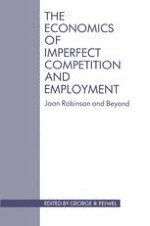1989 | OriginalPaper | Buchkapitel
Competition and the Number of Participants: Lessons of Edgeworth’s Theorem
verfasst von : Takashi Negishi
Erschienen in: The Economics of Imperfect Competition and Employment
Verlag: Palgrave Macmillan UK
Enthalten in: Professional Book Archive
Aktivieren Sie unsere intelligente Suche, um passende Fachinhalte oder Patente zu finden.
Wählen Sie Textabschnitte aus um mit Künstlicher Intelligenz passenden Patente zu finden. powered by
Markieren Sie Textabschnitte, um KI-gestützt weitere passende Inhalte zu finden. powered by
In his Mathematical Psychics (1881), Edgeworth demonstrated in so-called Edgeworth equivalence theorem that the outcome of an exchange economy where traders act cooperatively is identical to the Walrasian equilibrium of perfect competition where traders act non-cooperatively as price-takers, when the number of traders of the same type is infinitely large. Certainly it clarifies an implication of Walrasian economics and is a pioneering work of the recent theory of a large economy composed of infinitely many small traders. 1When the number of traders is limited, Edgeworth argued, traders themselves cannot determine the outcome of an exchange economy cooperatively and the utilitarian principle should be introduced to arbitrate disagreement between traders. Since the infinity of identical traders is a sufficient condition in the proof of Edgeworth’s equivalence theorem, however, a natural question is whether it is also a necessary one. If it is not necesary, what is essential for Walrasian economies is not so much the infinity of the number of small traders as perfect information and no friction, also assumed in Edgeworth’s theorem.
